Tableau developers play a crucial role in transforming data into actionable insights. They bridge the gap between data science and business strategy, making complex information accessible and understandable through visual representation.
Skills required for a Tableau developer include proficiency in Tableau software, understanding of data analysis and visualization principles, and abilities in problem-solving and effective communication.
Candidates can write these abilities in their resumes, but you can’t verify them without on-the-job Tableau Developer skill tests.
In this post, we will explore 8 essential Tableau Developer skills, 9 secondary skills and how to assess them so you can make informed hiring decisions.
Table of contents
8 fundamental Tableau Developer skills and traits
The best skills for Tableau Developers include Tableau Proficiency, Data Analysis, SQL Skills, Business Intelligence, Data Warehousing, Data Modeling, Attention to Detail and Problem Solving.
Let’s dive into the details by examining the 8 essential skills of a Tableau Developer.
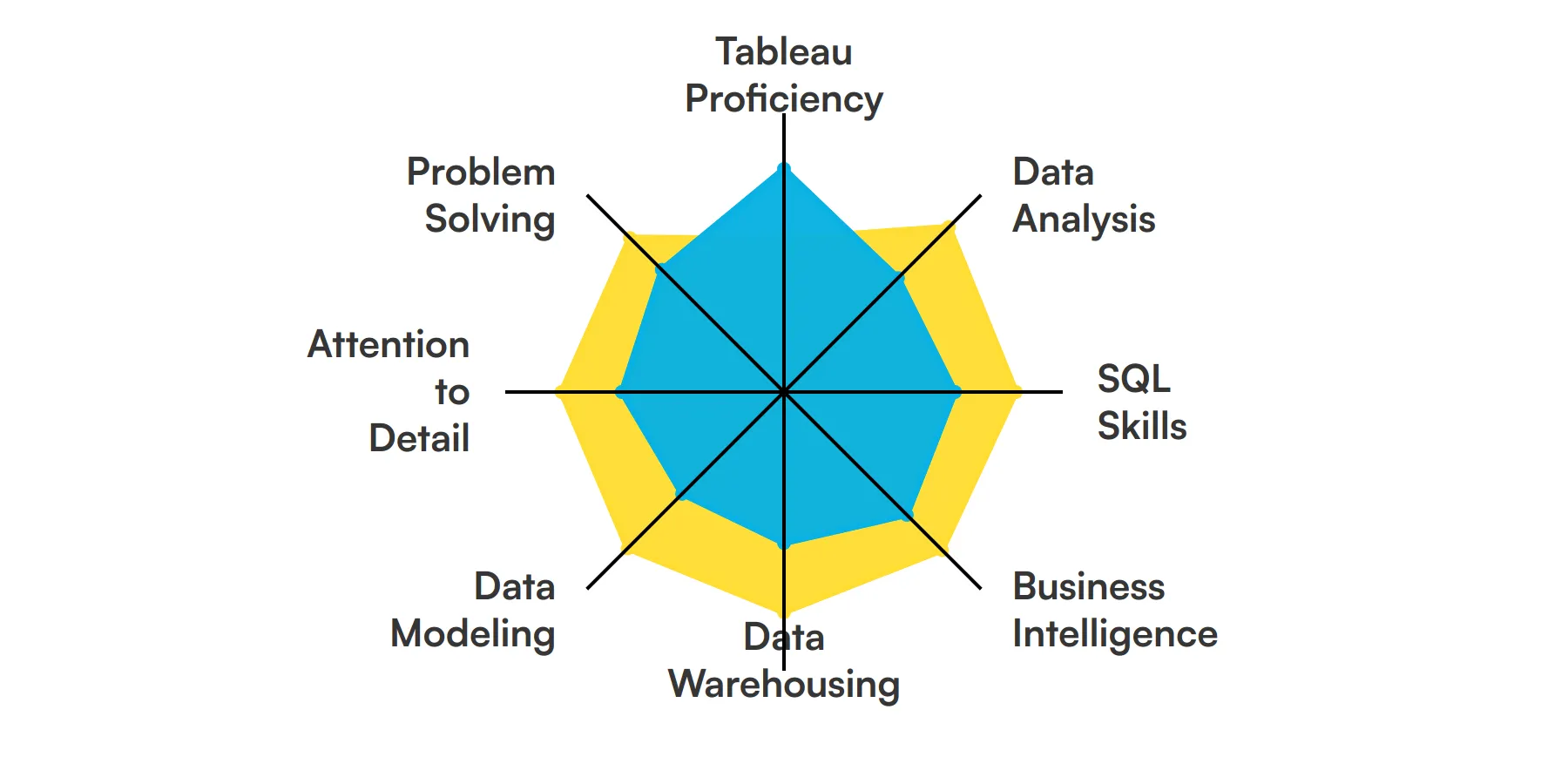
Tableau Proficiency
A Tableau Developer must have a deep understanding of Tableau's software suite. This includes the ability to create complex visualizations, manage data sets, and optimize dashboards for performance. Mastery of Tableau helps in transforming raw data into insightful and interactive visual reports.
For more insights, check out our guide to writing a Tableau Developer Job Description.
Data Analysis
Analyzing data is at the core of a Tableau Developer's role. They need to interpret data to find patterns, trends, and insights. This skill is crucial for making data-driven decisions and recommendations, which are essential for business strategies.
SQL Skills
SQL is fundamental for querying databases. A Tableau Developer uses SQL to retrieve, manipulate, and analyze data that feeds into Tableau. Strong SQL skills ensure accurate data retrieval and efficient data manipulation, which are critical for effective Tableau visualizations.
Check out our guide for a comprehensive list of interview questions.
Business Intelligence
Understanding BI concepts helps a Tableau Developer align their work with the strategic goals of a business. This includes knowledge of BI tools, methodologies, and processes which are key to delivering actionable insights through Tableau dashboards.
Data Warehousing
Knowledge of data warehousing principles is important for a Tableau Developer to manage data effectively. This includes understanding how data is collected, stored, and accessed, which directly impacts the efficiency of data visualization projects.
For more insights, check out our guide to writing a Data Architect Job Description.
Data Modeling
Data modeling involves designing data systems and databases. For a Tableau Developer, this skill is important to ensure that databases are structured in ways that support efficient data analysis and visualization.
Attention to Detail
Precision is key in data visualization. A Tableau Developer must ensure that every aspect of the dashboard is accurate and effectively communicates the right information. This includes checking data sources, visualization accuracy, and dashboard usability.
Check out our guide for a comprehensive list of interview questions.
Problem Solving
A Tableau Developer often encounters complex data-related challenges. Effective problem-solving skills are necessary to devise innovative solutions for data visualization and to overcome obstacles in data integration and dashboard creation.
9 secondary Tableau Developer skills and traits
The best skills for Tableau Developers include Project Management, Collaboration, Data Cleaning, Advanced Excel, User Interface Design, Communication, Continuous Learning, Scripting Languages and Data Security.
Let’s dive into the details by examining the 9 secondary skills of a Tableau Developer.
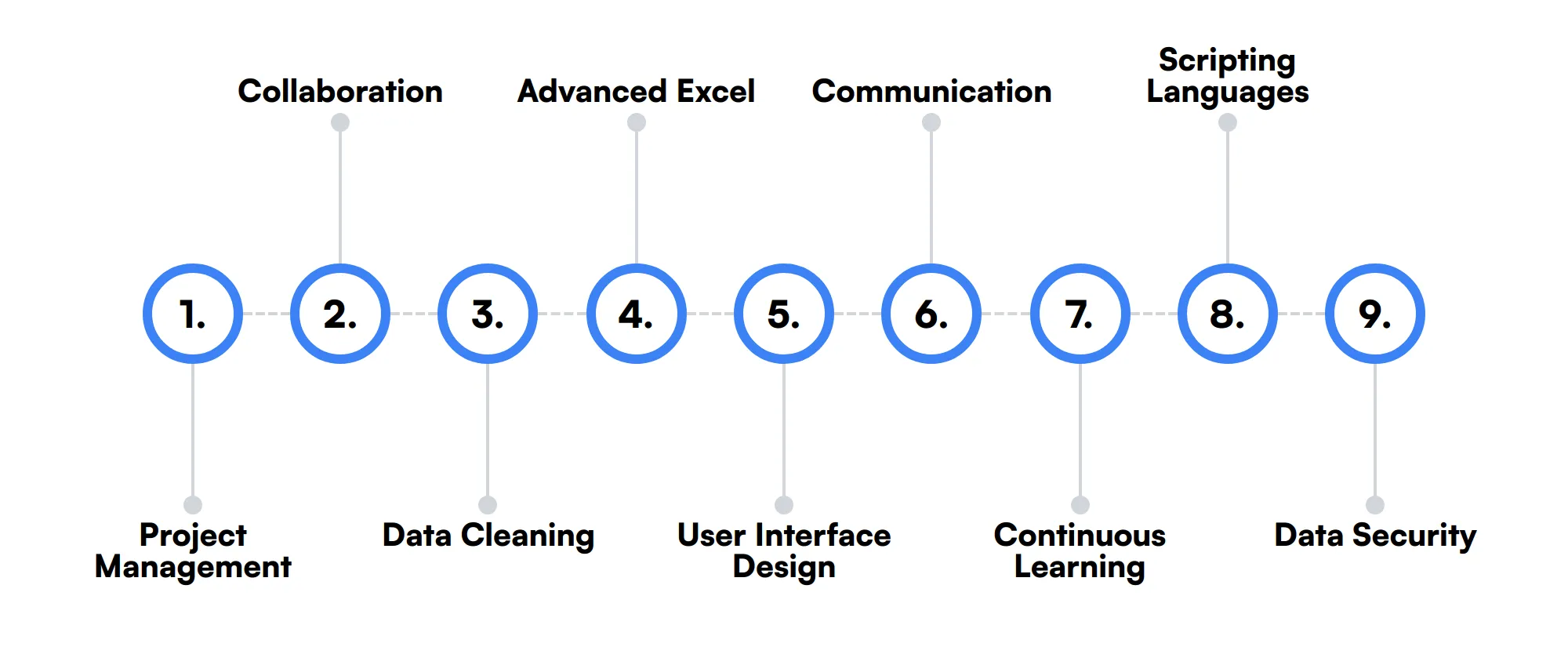
Project Management
Organizing and managing projects efficiently ensures that Tableau development tasks are completed within deadlines and specifications.
Collaboration
Working with other team members, including data analysts, IT staff, and business stakeholders, is common for Tableau Developers.
Data Cleaning
Preparing data by removing inaccuracies and processing it for use in Tableau is a valuable skill for ensuring the quality of visualizations.
Advanced Excel
Proficiency in Excel complements Tableau skills, especially for manipulating data sets and performing complex calculations before visualization.
User Interface Design
Designing intuitive and effective user interfaces in Tableau helps in creating more engaging and easy-to-understand visual reports.
Communication
Effectively communicating insights from data visualizations to non-technical stakeholders is crucial for a Tableau Developer.
Continuous Learning
The field of data visualization is constantly evolving, and staying updated with the latest Tableau features and data trends is beneficial.
Scripting Languages
Knowledge of scripting languages like Python or R can enhance a Tableau Developer's ability to manipulate data and extend Tableau's capabilities.
Data Security
Understanding principles of data security ensures that a Tableau Developer can handle sensitive data responsibly in their visualizations.
How to assess Tableau Developer skills and traits
Assessing the skills and traits of a Tableau Developer involves more than just reviewing their resume. While a resume can highlight their experience and certifications, it doesn't provide a complete picture of their proficiency in key areas such as Tableau Proficiency, Data Analysis, SQL Skills, Business Intelligence, Data Warehousing, Data Modeling, Attention to Detail, and Problem Solving. To truly understand a candidate's capabilities, you need a more hands-on approach.
Skills-based assessments are an effective way to evaluate a candidate's competencies in real-world scenarios. These assessments can help you determine if the candidate has the practical knowledge and problem-solving abilities required for the role. Adaface on-the-job skill tests can significantly streamline this process, offering a 2x improved quality of hires and an 85% reduction in screening time. By using these assessments, you can ensure that you are selecting the best candidate for your Tableau Developer position.
Let’s look at how to assess Tableau Developer skills with these 6 talent assessments.
Tableau Online Test
Our Tableau Online Test evaluates a candidate's proficiency in utilizing Tableau for data visualization tasks, including connecting to multiple data sources, cleaning data, and creating comprehensive dashboards.
The test assesses the candidate's ability to manage and manipulate data within Tableau, focusing on skills such as sorting, filtering, and applying Tableau-specific calculations and Level of Detail (LOD) expressions.
Successful candidates demonstrate the ability to effectively annotate, format, and publish visualizations, ensuring clarity and accessibility in the presentation of data.
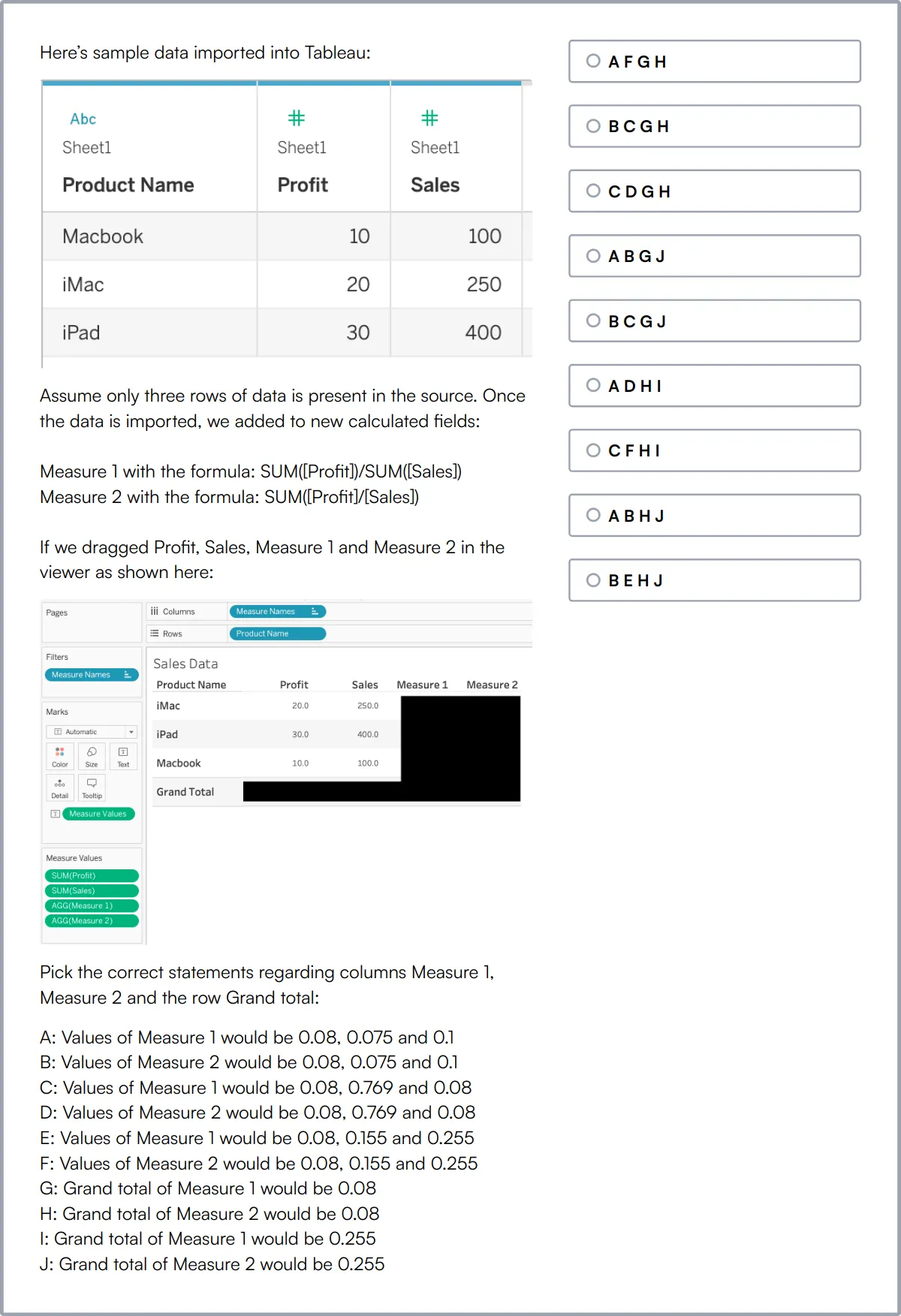
Data Analysis Test
Our Data Analysis Test measures a candidate's capability to analyze and interpret data using statistical methods and tools, including SQL and Excel.
This test challenges candidates to apply their knowledge in practical scenarios involving data queries, analysis of business metrics, and data interpretation using charts and graphs.
Candidates excelling in this test are adept at extracting insights from data, predicting outcomes, and identifying data anomalies.

SQL Online Test
The SQL Online Test is designed to assess a candidate's skills in SQL database management, including creating, managing, and querying databases.
It evaluates the candidate's proficiency in writing efficient SQL queries, using joins, subqueries, and understanding SQL functions and procedures.
High-scoring candidates will show a strong ability to optimize database queries and manage database security and transaction controls.

Business Objects Online Test
Our Business Objects Online Test assesses proficiency in SAP Business Objects tools, focusing on data modeling, report development, and data integration.
The test evaluates skills in creating and managing reports, scheduling tasks, and implementing security measures within the Business Objects environment.
Candidates who perform well on this test demonstrate their ability to optimize the performance of Business Objects deployments and ensure data accuracy and security.
Data Warehouse Online Test
The Data Warehouse Online Test evaluates a candidate's understanding of data warehousing concepts, including the design and maintenance of data storage solutions.
This test covers SQL basics, ETL processes, and data modeling principles necessary for effective data warehousing.
Effective candidates will display proficiency in managing complex data structures and optimizing data retrieval and storage strategies.
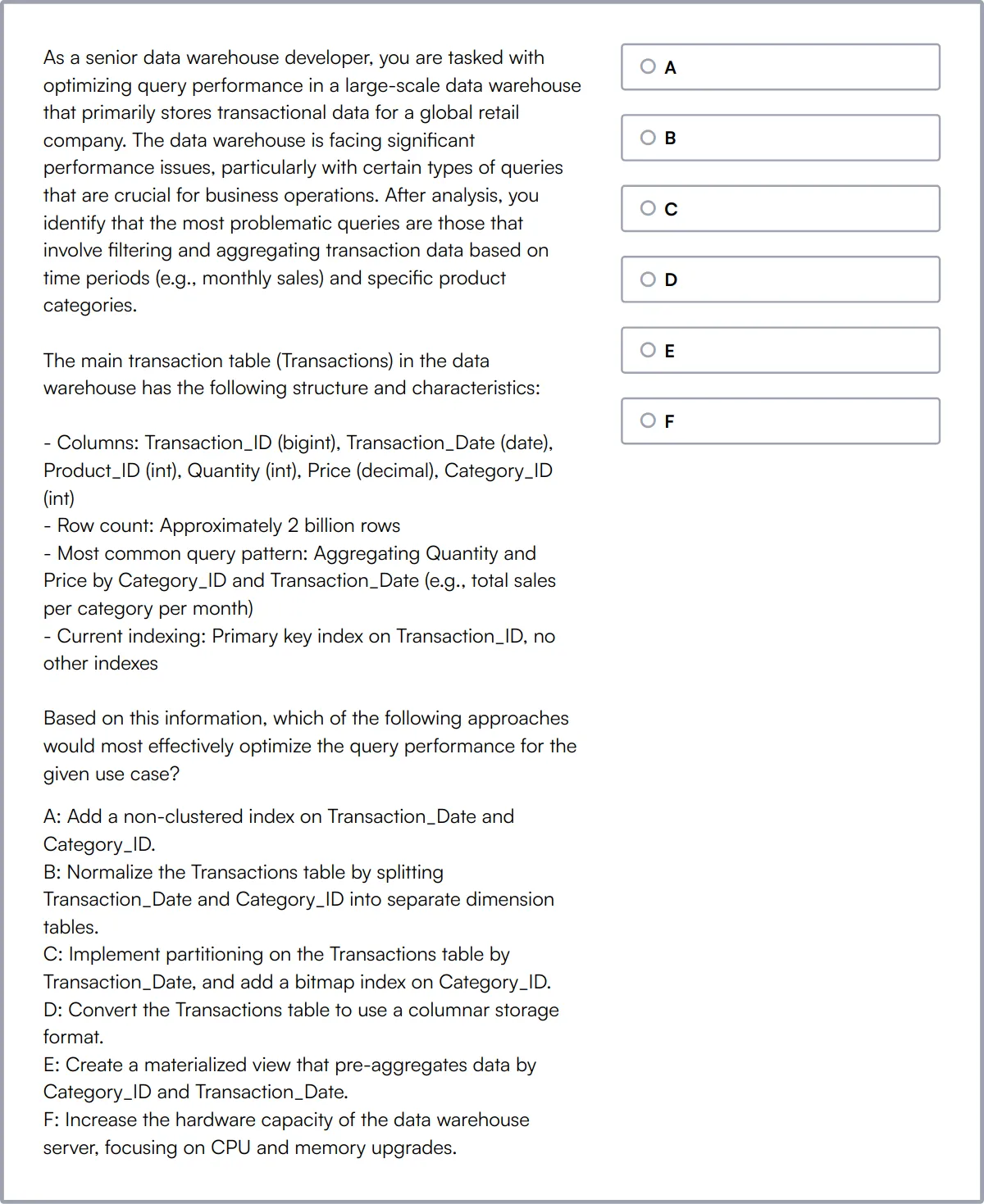
Data Modeling Skills Test
Our Data Modeling Skills Test assesses a candidate's ability to design and implement relational database models, ensuring data integrity and efficiency.
The test examines knowledge in areas such as ER diagrams, normalization, and SQL, focusing on the candidate's ability to create accurate and scalable data models.
Candidates who excel in this test are skilled in data transformation and validation, crucial for maintaining the accuracy and usability of data in business applications.
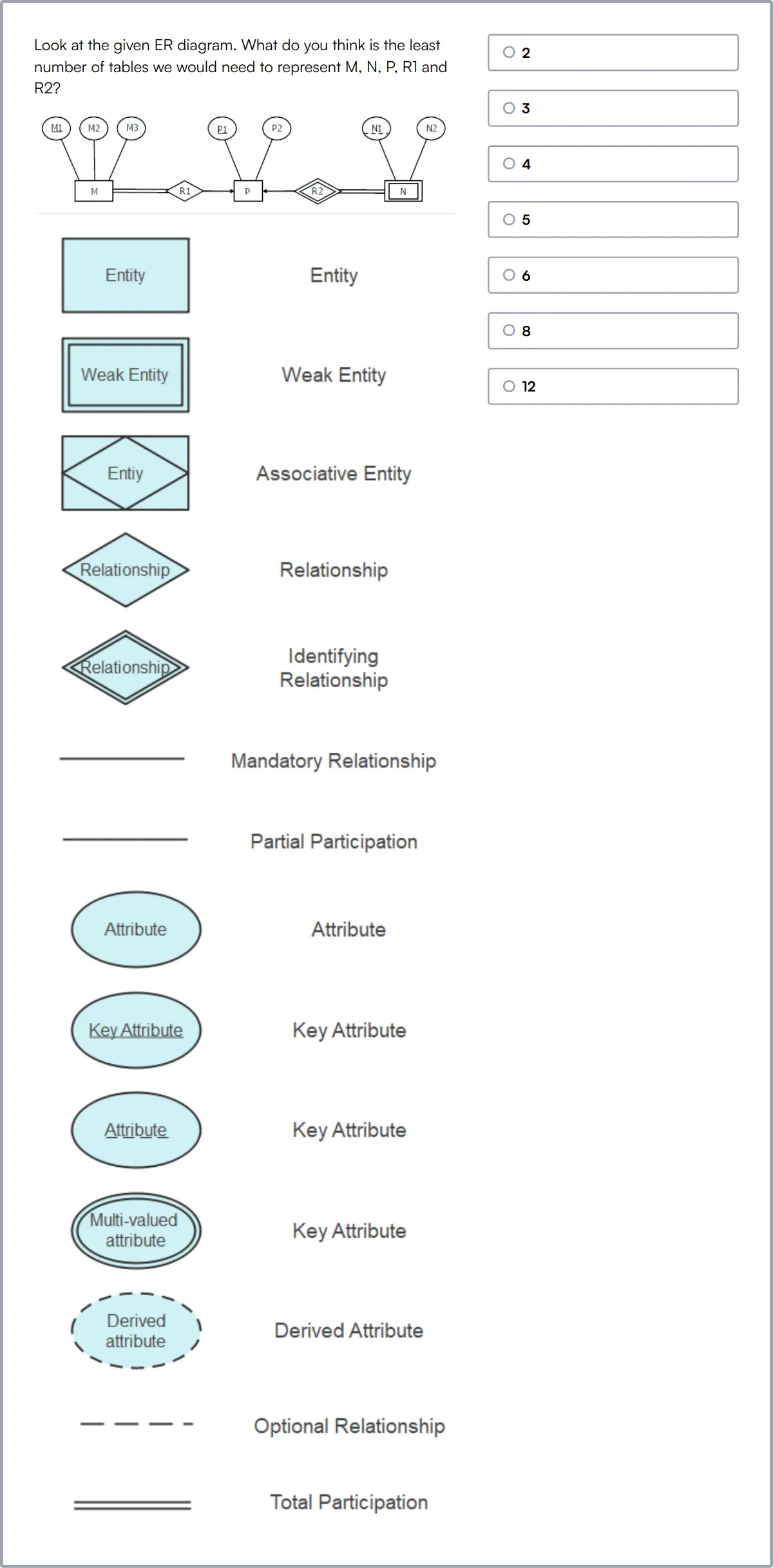
Summary: The 8 key Tableau Developer skills and how to test for them
| Tableau Developer skill | How to assess them |
|---|---|
| 1. Tableau Proficiency | Evaluate ability to create insightful, interactive dashboards and visualizations. |
| 2. Data Analysis | Assess skills in interpreting and deriving insights from data sets. |
| 3. SQL Skills | Measure proficiency in querying and managing relational databases. |
| 4. Business Intelligence | Check understanding of BI tools and techniques for data-driven decisions. |
| 5. Data Warehousing | Evaluate knowledge in designing and managing data storage solutions. |
| 6. Data Modeling | Assess ability to create logical and physical data models. |
| 7. Attention to Detail | Determine accuracy and thoroughness in data handling and reporting. |
| 8. Problem Solving | Evaluate capability to identify issues and develop effective solutions. |
Tableau Online Test
Tableau Developer skills FAQs
What are the key skills required for a Tableau Developer?
Key skills include Tableau proficiency, data analysis, SQL, business intelligence, data warehousing, data modeling, attention to detail, problem solving, project management, collaboration, data cleaning, advanced Excel, user interface design, communication, continuous learning, scripting languages, and data security.
How can I assess a candidate's Tableau proficiency?
Assess Tableau proficiency by reviewing their portfolio, conducting a practical test, and asking about specific projects they have completed using Tableau.
Why is SQL important for a Tableau Developer?
SQL is important because it allows developers to query databases, extract data, and prepare it for visualization in Tableau.
What role does data analysis play in a Tableau Developer's job?
Data analysis helps developers interpret data, identify trends, and create meaningful visualizations that support business decisions.
How can I evaluate a candidate's problem-solving skills?
Evaluate problem-solving skills by presenting real-world scenarios and asking how they would approach and resolve the issues.
What is the significance of data modeling in Tableau development?
Data modeling is significant because it structures data in a way that makes it easier to analyze and visualize in Tableau.
How important is communication for a Tableau Developer?
Communication is important as developers need to explain their findings and visualizations to stakeholders who may not have a technical background.
What should I look for in a candidate's portfolio?
Look for a variety of projects that demonstrate their ability to handle different types of data, create insightful visualizations, and solve complex problems.

40 min skill tests.
No trick questions.
Accurate shortlisting.
We make it easy for you to find the best candidates in your pipeline with a 40 min skills test.
Try for freeRelated posts
Free resources



